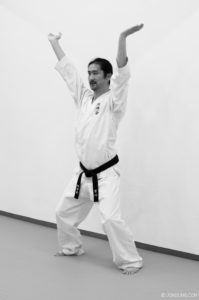Do you want to improve at martial arts? If you started learning and go to class regularly, I certainly hope so! Going to class is good, and you are certainly already improving but if you want to bring your skills to the next level, you might have to think of other ways.
#1 Train on your own
No one improves at the dojo.
That sounds like a very bold statement, but it is true. Showing up to class and going through patterns alone is not enough for most people. If you want to improve you need to take things the opposite way: your time at the dojo is a time to get insights. Your teacher will give your corrections, advice and your partners will give you feedback. And with all these in hands, you have everything you need to work on your own, alone or with some friends and improve.
True progress comes to people who are regular in their practice. If you have learned a foreign language or a music instrument, you are certainly aware that practicing once a week only brings very little results, if anything. Why would martial arts be different?
#2 Identify gaps
A chain is only as strong as its weakest link.
Martial arts training requires a deep and honest analysis of your own skills and gaps. Our brains are often wired so we train in what we are good at, simply because… it makes us feel good! But does it help us get better? Probably a bit, but certainly not as much as it could if you were taking things the opposite way.
You can be strong, but if you are unable to move, you will be limited.
You can be mobile, but if your body is not strong enough to affect your opponent, that will be of very little use.
You can know a lot of techniques, but if you don’t understand distance and timing, you will not be able to apply them.
In other words, don’t stay in your zone of comfort and don’t try to be the best at one specific skill. It’s not about strengthening your existing strengths, it’s about managing your weakness.
#3 Question everything
If improving means going out of your zone of comfort, it means you need to challenge everything. That doesn’t mean going to your teacher in the middle of the class and telling him you do not believe in what he’s showing or saying, but rather asking yourself why things are like this. Keep asking yourself why a movement is done the way it is, why your technique worked or didn’t, why the movement of your partner had that type of impact on you. You don’t need to do that in class, but that’s something you can take home with you.
Same goes to your personal training (if you still don’t train on our own, go back to #1 now). This is a time when you can look deeper at how your body feels, and try new ideas that you may have.
A direct consequence of that is you should not leave the dojo without a takeaway. If you haven’t learned anything new, there was no point coming in the first place.
#4 Build a martial body
You can learn as many techniques as you want, truth is they won’t work if you don’t have a body able to apply them. Actually, having a properly conditioned body is more likely to compensate for a lack of technical skills than the opposite.
Some people are naturally gifted with bodies that allow them to use techniques to their full potential and that is not only true for martial arts. Look at people like Cristiano Ronaldo and Roger Federer, what differentiates them from their competitors is not only their technical skills, it’s the way they perfectly handle the way they move.
We are not all gifted however, and it means for the majority of us we need to build a body that is fit for martial arts, whatever that means for your specific art. It can mean being able to use your body as a whole or dissociate it, being able to transmit weight to your opponent or to move lightly, or even to be able to make very complex movements. Whatever your goals are, a better understanding and awareness of your body and an increase in mobility is essential, to the point I am even wondering if it makes sense to learn any technique before having built a decent body.
To prove this point, I’ll take a very simple example. A very common point in martial arts is to take the balance of your opponent, to break his structure so he won’t be able to resist the techniques applied to him. If your own body is unbalanced from the start, your opponent already has the upper hand.
#5 Attend seminars or take private classes
Your teacher can be the best teacher in the world, it doesn’t mean he knows everything or that he can explain everything in a language you understand. Sometimes you need to meet different people and hear the same concepts exposed in a different way to better understand them. This can be done with teachers of the same school, or teachers from other schools. Bottom line is: be open-minded and accept new ideas.
Private classes are another way of boosting your level and understanding as you will get individual feedback, which is not always possible in a large class setting.
I personally attended countless seminars and took a great number of private classes, and I dare say they really helped me get there faster.
#6 Be curious
Keep your eyes open and don’t be dogmatic. Different arts have different strategies and context, different people move differently, it’s neither good nor bad. Try to understand what people do what they do, read books, watch videos, meet people. Identify the best people and look at what they do: what is it that makes them better than the rest?
#7 Don’t be satisfied
Martial arts is an endless learning, and however advanced you might be, it is likely you don’t know everything yet. Don’t be satisfied by what you can do, keep looking at how you could it even better!
The day you are happy with what you are doing is the day you stop improving.


